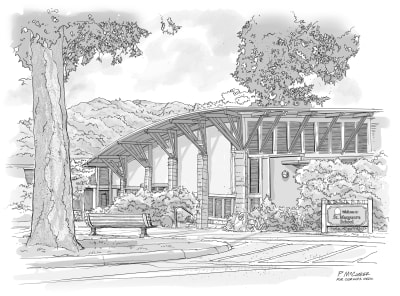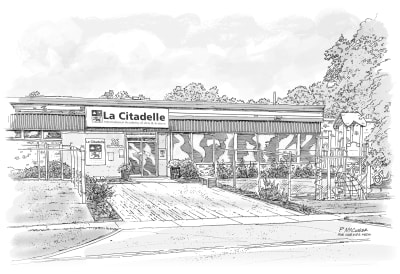The IB organization, based out of Geneva, Switzerland, was created in 1968 to provide a curriculum that would meet the particular needs of diplomats' children as they moved around the world. In today's global village, IB benefits anyone looking for a richly international approach to study.
The non-profit group offers programs to students ages 3 to 12 (primary) and 11 to 16 (middle), culminating with the diploma program for ages 16 to 19. Ninety-six Canadian schools offered the diploma program as of May 2005. IB is also offered by 111 middle schools and 17 primary schools. Worldwide, about 1,250 schools have passed IB's rigorous accreditation process. Bob Poole, director of the Vancouver, British Columbia office and head of recognition division of IB North America, says IB schools usually incorporate student course registration and exam fees, which run about $750 per full IB diploma program, into tuition.
Schools are drawn to the IB program's academic philosophy. In the two-year diploma program, students are required to take a diverse core group of classes: first-language literature (French or English), a second language (such as Spanish or Mandarin), social studies, math, and science. Alternatively, students can take individual IB courses, but receive only a certificate and not the diploma. The diploma is IB's calling card, since many colleges and universities worldwide recognize it in the way of college credits, Poole says.
IB diploma students must write provincial exams in addition to completing their IB work, except in B.C. To receive their IB diploma, students also must write a 4,000-word essay. Grading follows international criteria, meaning nothing is graded on a curve (something Poole says post-secondary schools like because every student is assessed on a level playing field).
What excites high schools is the focus on inquiry-based thinking. Rosemary Evans, director of academic studies at Toronto, Ontario girls' school Branksome Hall, says that focus explains why "IB has become the program for our school," meaning all 850 students study it. "The students ask questions and look at things from different points of view," says Evans. "That is true from kindergarten through to Grade 12." Grade 6 students, for example, recently investigated the effectiveness of charitable organizations.
Apart from the academic rigour, IB proponents applaud its balanced approach. To receive their IB diploma, students must complete a minimum of 150 hours in what is called CAS (creativity, action and service). That means students hit the books but also participate in drama or music, sports and community work. This results in "more well-rounded students," says Barbara Goodwin-Zeibots, founding head of school at Toronto's The York School. She points out that's why average students, and not just gifted ones, blossom under the IB Programme. The York School is the first independent school in Canada to integrate IB into its curriculum across all its grade levels: primary years (Grades 1 to 6), middle (7 to 10) and diploma (11 and 12).
Sasha Toten, a York School graduate starting her second year at Pennsylvania's Bryn Mawr College, says the balanced approach armed her with effective time management skills. "At college, I play soccer, volleyball, intramural hockey and edit the sports section of the campus newspaper," Toten says. "If I wasn't able to do all that, I would feel I was missing out on something." For additional information, see our listings for International Baccalaureate schools.
Advanced Placement (AP)
Alex Dubec doesn't feel he missed out on anything. The graduate of West Island College, in Calgary, Alberta had offers from prestigious universities in Canada, like the University of Waterloo, and in the United States, like Princeton. But the 16-year-old couldn't turn down Harvard, where he expects to pursue an engineering degree. Why were so many elite schools attracted to Dubec? He suspects it's because of the Advanced Placement (AP) program.
AP began in 1952 as a pilot program created by top colleges and universities to prepare students for the demands of college. The program continues that aim today: Students can choose from 34 college-level courses across 19 subject areas, ranging from chemistry to Italian language and culture, which will be added in 2006.
More than 15,000 schools worldwide offer the AP program, including close to 500 schools in Canada. That number is increasing by about 25 per cent each year, says George Ewonus, director of the AP program in Canada. Ewonus calls AP an 'enrichment" program because a student chooses to take an AP course in addition to regular class work.
The AP course typically runs two years: Grades 11 and 12. That means a student taking AP in chemistry, for instance, would also study the regular school curriculum in chemistry. But the AP chemistry student would be required to do additional study to meet the demands of AP. At the end of Grade 12, the student writes a chemistry AP exam, which represents 100 per cent of the student's AP mark (the exam is graded externally using "curriculum-based standards," which means no bell curve). Students pay only the cost to write the exam, about $93, although some schools absorb part, or even all, of the expense.
One of AP's biggest benefits is the recognition given to AP by universities and colleges. The College Board, a non-profit association that serves 3,500 universities and colleges in North America and abroad, administers the program. Ewonus says every university in Canada accepts AP credits, except Queen's University in Kingston, Ontario, although Queen's expects to introduce a policy this fall.
High school administrators and students praise the program's flexibility. "Advanced Placement offers choice," says Murray Marran, director of admissions at West Island College. "You can take just one course, or six. It's totally up to the individual." He says that's why the program can be tailored to both gifted and average students: If they only have an interest or time to take, say, an English AP course in addition to the school's regular curriculum, that's all they have to take.
In Dubec's case, "I shied away from psychology AP because I wasn't too keen on it, and I'm not that big on European history," he says. 'But I enjoy the sciences, which is why I focused on that area." There's little risk, since students don't have to forward their AP grades to universities and colleges; AP grades can be withheld or cancelled at the request of the student.
AP's "tremendous flexibility" carries over into how the post-secondary credits can be used, says Ewonus. For instance, "if students have seven or eight (AP) courses, basically a year and a bit of (university) credit, they could do a double (major or) honours degree but carry the same course load as a student with a single major." Or, he says, students can choose to take second-level courses, or save money by taking fewer courses in first year.
MacLachlan College, which offers JK to Grade 12, started offering AP two years ago. John Ferguson, head of the Upper School and director of academic studies at the Oakville, Ontario school, says it's great if students receive a university credit. The program, however, is really about improving students' chances of post-secondary success. Since 100 percent of the AP mark is determined by one exam, "students have to do a lot of work on their own. They have to become independent thinkers and better manage their time." For additional information, see our schools with the AP program.











